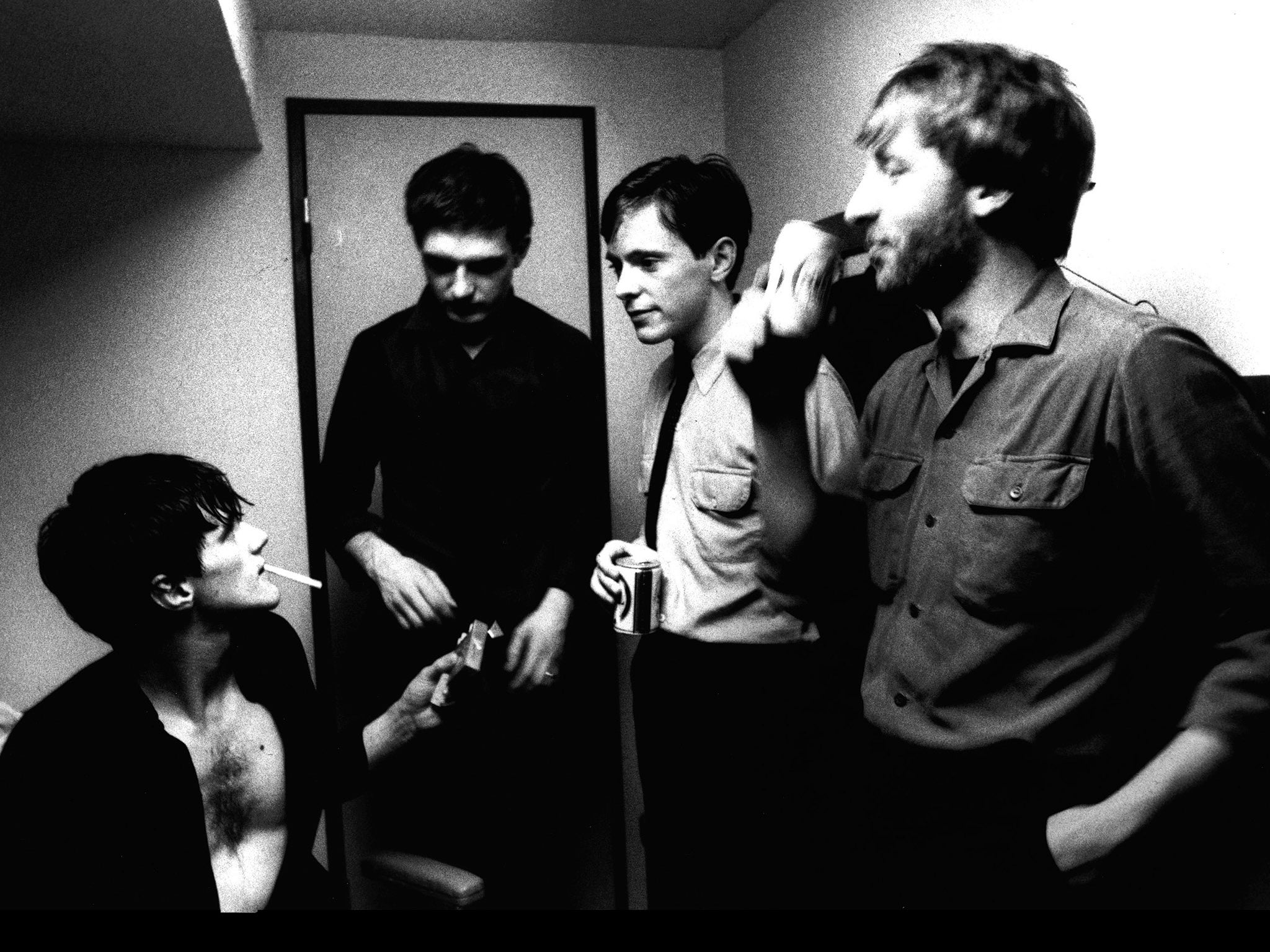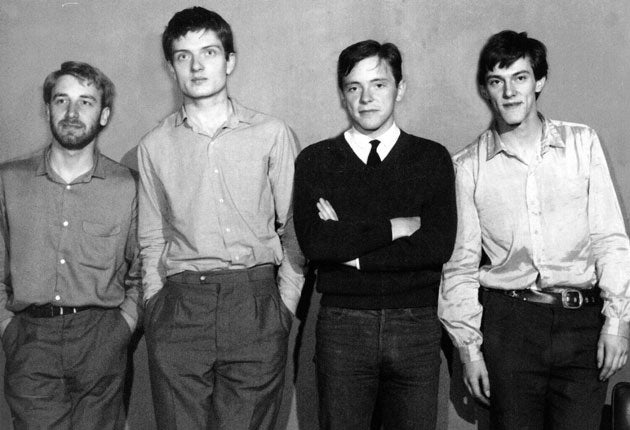Joy Division's Bernard Sumner remembering the dangerous path fellow bandmate Ian Curtis was walking
In an extract from his memoir, Bernard Sumner recalls the death of his Joy Division bandmate Ian Curtis

Your support helps us to tell the story
From reproductive rights to climate change to Big Tech, The Independent is on the ground when the story is developing. Whether it's investigating the financials of Elon Musk's pro-Trump PAC or producing our latest documentary, 'The A Word', which shines a light on the American women fighting for reproductive rights, we know how important it is to parse out the facts from the messaging.
At such a critical moment in US history, we need reporters on the ground. Your donation allows us to keep sending journalists to speak to both sides of the story.
The Independent is trusted by Americans across the entire political spectrum. And unlike many other quality news outlets, we choose not to lock Americans out of our reporting and analysis with paywalls. We believe quality journalism should be available to everyone, paid for by those who can afford it.
Your support makes all the difference.Joy Division finished the 1970s on a high. Our debut album, Unknown Pleasures, was doing well, we’d just finished a hugely enjoyable and successful tour, the band’s profile was higher than it had ever been and it seemed to be growing by the day. We embarked upon the 1980s excited about what was to come. We went into the studio in March 1980 to record our second album, Closer.
Ian [Curtis] didn’t enjoy Closer as much as he’d enjoyed Unknown Pleasures. For one thing, he thought that the keyboards “made it sound like fucking Genesis”, but he was also having a bit of a difficult time in his personal life and was quite often in an antagonistic frame of mind.
He’d started a relationship with Annik Honoré, a music journalist from Brussels who worked for the Belgian Embassy in London, and he was in a vulnerable frame of mind while we were down in the capital. It was another Ian contradiction: he felt guilty about the affair because he was married to Debbie and they had a baby girl, Natalie, only a few months old, but at the same time he still wanted to be with Annik. It wasn’t like Ian to have an affair, and with this, along with his epilepsy, he was walking a dangerous path.
We were all staying together in a flat not far from the studio in which the bedrooms were at opposite ends. Steve (Stephen Morris), Hooky (Peter Hook) and Rob Gretton, our manager, were in one part, while Martin Hannett, the producer, Ian and I shared the other side. Annik came and stayed for a while, but from the moment she arrived there seemed to be a bit of an “Oh look, it’s John and fucking Yoko” vibe from Rob and Hooky.
They started playing all sorts of jokes on them. Inevitably, it led to a falling-out when Ian got sick of it. Strange as it may sound, it wasn’t until after his death that we really listened to Ian’s lyrics and clearly heard the inner turmoil in them, way back to his lyric writing in the early days. I can only imagine what was going on in his head. He never talked to us or indicated anything about any deep-seated problems he may have had but, sadly, it was there in his words, right from the start.
One day in early April, only a few days after getting back from London, we all got a call from Rob to say that Ian had taken an overdose. He wasn’t dead, he’d called the ambulance himself, but he was in hospital.
After he got out I invited him to come and stay with me. I tried to talk to him about what was going on. I’d talk to him about all sorts of things, what books he liked, for example, just trying to help as best I could, keep him stimulated. At one point I asked him straight if he’d really intended to commit suicide or was it a classic cry for help. He was unequivocal. “I definitely intended to kill myself,” he said. “The only reason I bottled out was that I didn’t think I had enough tablets and I’d heard that if you don’t take enough to kill you, you can end up with brain damage.”
But you never knew if Ian really meant what he was saying. I tried to be straight with him, to pull him up. We were walking back from rehearsals one night, back to where I was living at the time, in a place called Peel Green, in Salford and I purposely took us through the big cemetery there, pointing at the gravestones saying, “It’s fucking stupid, Ian. Imagine what it would be like to see your name on one of them. I can’t tell you which way to go in your life, but killing yourself definitely isn’t the answer.” I was trying to make him see what a waste of a life it would have been if he’d succeeded, but I didn’t get much of a response.
As human beings, we all mature physically from childhood to adolescence and then into adulthood, but our emotions lag behind. Your twenties are a particularly difficult period: you go through a sequence of emotional storms in your relationships. But you aren’t yet equipped to deal with some of the shit that life throws at you. I think if you can make it through your twenties you can pretty much deal with anything. Sadly, Ian turned out to be one of those people who couldn’t.
Enjoy unlimited access to 100 million ad-free songs and podcasts with Amazon Music
Sign up now for a 4 month free trial (3 months for non-Prime members)
Enjoy unlimited access to 100 million ad-free songs and podcasts with Amazon Music
Sign up now for a 4 month free trial (3 months for non-Prime members)
We all tried to steer him away from even considering suicide. We’d written two new songs while Ian was in hospital, “In a Lonely Place” and “Ceremony”, which we thought would cheer him up, keep things moving forward and stop him from dwelling on the past.
We performed the songs for the first time in Birmingham. After that, we were due to head off for our first tour of America. Everyone was excited. I went into Manchester with Ian to buy clothes for the tour. He bought some horrible shoes, suede winklepickers with laces on the heels. I said to him, “Ian, they’re like dead men’s shoes.” I don’t know why the fuck I said that.

Just before we were due to leave for Blackpool, I had a call from him saying he wanted to go and see Debbie before leaving for America. We arranged to meet at the airport.
I went down to see some friends in a band called Section 25. They lived just outside Blackpool, near a river and I had a brilliant day. One of the Section 25 lads had the keys to his dad’s old speedboat and it was fantastic, I learned how to water-ski – badly – and it was great, really good fun, and a beautiful sunny day. We all went back to their house afterwards and I was in the kitchen at about four o’clock in the afternoon when the phone rang. One of the band answered and said, “Bernard, it’s for you, it’s Rob.”
“All right, Rob,” I said, “how are you?”
I was just about to launch into what a great day I’d had when I heard him say something about Ian committing suicide. “Oh, bloody hell,” I said. “He’s not tried it again, has he?”
“No, Bernard,” said Rob. “This time he’s done it, he’s committed suicide. He’s dead.”
The room swam in front of my eyes and I was hit full on by a wave of shock. I said again, “What, he’s tried it?”
“No,” Rob said. “He’s really done it, Bernard. He’s dead. Ian’s dead.”
Poor Rob, he had to tell me a couple of times before it sank in. I slid to the floor in shock. I didn’t speak, didn’t want to say a word to anyone. Section 25 really looked after me out there. Everyone was good to me, the guys from A Certain Ratio too, but I didn’t really speak until the funeral. Everyone else went to see Ian in his coffin beforehand, but I couldn’t face that. I wanted to remember him as he was when he was alive.
A curious thing had happened the day before Ian died. I’d been to Heaton Park in Prestwich with Simon Topping from A Certain Ratio and it was a lovely sunny day. There’s a large hill in Heaton Park and, as we stood at the bottom of it, a beautiful white horse came galloping over the crest. It had no rider, no saddle, it was just this amazing creature of pure white thundering down the hill towards me and Simon. The park was busy with people enjoying the sunshine, but the horse made straight for us. It stopped right in front of us, tossed its mane, dipped its head a couple of times, and we stood looking at each other for a minute or so. It seemed odd even at the time but, given the events of the night that lay ahead, I wonder if it could have been some kind of omen.
Chapter and Verse by Bernard Sumner is out now. © Bernard Sumner 2015
Join our commenting forum
Join thought-provoking conversations, follow other Independent readers and see their replies
Comments